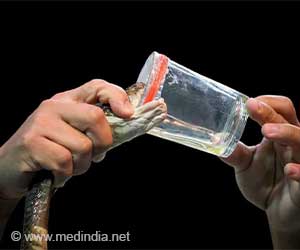Every person in the country and even the world needs a medical system that can provide good healthcare at no cost or minimal cost and the only such system is yoga.
Can mass practice of yoga help India compete with China in economic growth? Yoga guru Swami Ramdev is convinced it can.
Speaking at a discussion on 'Bridging the gap: nanohealth' held as part of the Assocham-organised 5th Global Knowledge Millennium Summit on bio and nanotechnology here last week, Ramdev said the majority of India's population could not afford healthcare."India spends around Rs.500,000 crore (Rs.5 trillion) annually on various health services. The truth is that only 35 percent of Indians are able to afford medical treatment and 65 percent of the country's population are not able to afford the costs of medicines and treatment," said Ramdev, just back after an extensive tour of the US, Europe and Africa.
"Every Indian has to bear 93 percent of the medical expenses and the government's contribution is a negligible seven percent."
He said that even if one assumed that every Indian could afford to take allopathic medicines, the total expenditure would be to the tune of Rs.13.7 trillion.
"Hence disease prevention is the key to India's economic growth," he contended, adding yoga was the road to that end.
"Every person in the country and even the world needs a medical system that can provide good healthcare at no cost or minimal cost and the only such system is yoga."
Ramdev, who shared the dais with Peter Grutter, professor of physics and the world's leading authority on nanotechnology, claimed that yoga was very much a medical science like the allopathic system of treatment.
Calling his style of treating diseases through yoga an example of nanotechnology at work in medicine, he said, "In yoga, we use breathing techniques to treat a disease. This provides oxygen to the affected parts of the body.
"Just as nanotechnology has the potential to send nano particles within the body system to seek out and treat afflicted parts, pranayam in yoga sends oxygen to the remotest parts inside the body which need oxygen for cure."
He said that life itself has its origin in nanotechnology.
"Our very existence is a result of a form of nanotechnology at work. We are born after the fusion of egg and sperm. Aren't these nano particles?" he said.
Following the yoga guru's discourse, Grutter said, "From a philosophical point of view, as a scientist, for me it was very interesting how you described curing diseases through yoga."
On the question whether yoga was a science or not, the professor said, "There is no such thing as dogma in science. It is all about theories being proved.
"I liked what you (Ramdev) said - one should not mess with nature."
Grutter said that just like in other fields, nanotechnology had to be evaluated for its positive and negative impacts.
In the end, he said, it was all about what society needed.
"Do people want nano particles running in their body to cure some cancer or do they not?" he wondered.
In a broader perspective, however, the professor differed with the opinion of one of the session moderators, H.K. Chopra, chief cardiologist in Moolchand Hospital, who said that "the laws of science are the same as the laws of spirituality".
"I personally am not sure that science and spirituality can fuse. This is because both take different approaches though they might come to similar conclusions," Grutter said at the end of the stimulating discussion.
Source-IANS
SRM/S
 MEDINDIA
MEDINDIA
 Email
Email










